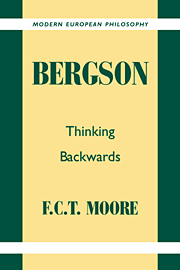Book contents
- Frontmatter
- Contents
- Abbreviations
- Preface
- Introduction
- 1 The Requirement of Precision
- 2 Philosophy and Knowledge: Uses and Misuses of ‘Representation’
- 3 Durance: Unfolding in Time
- 4 Laughter
- 5 Tension
- 6 Aporetic Philosophy
- 7 Branching
- 8 Going Beyond
- 9 Magic and the Primitive: The Antinomies of Pure Intelligence
- 10 Paradoxical Epilogue: Reason Ruefully Repressed
- Works Cited
- Index of Names
- Index of Subjects
10 - Paradoxical Epilogue: Reason Ruefully Repressed
Published online by Cambridge University Press: 05 June 2012
- Frontmatter
- Contents
- Abbreviations
- Preface
- Introduction
- 1 The Requirement of Precision
- 2 Philosophy and Knowledge: Uses and Misuses of ‘Representation’
- 3 Durance: Unfolding in Time
- 4 Laughter
- 5 Tension
- 6 Aporetic Philosophy
- 7 Branching
- 8 Going Beyond
- 9 Magic and the Primitive: The Antinomies of Pure Intelligence
- 10 Paradoxical Epilogue: Reason Ruefully Repressed
- Works Cited
- Index of Names
- Index of Subjects
Summary
We have seen throughout these explorations of Bergson's work a certain repression or devaluing of human reason. For Santayana, ‘he suffers from cosmic agoraphobia’. In other words, he fears the power of intelligence and therefore hastens to restrict its scope. But we have seen that Bergson's motive was not fear, but precision. We may revert to Oliver Sacks's discussion of that ‘romantic science’ which he found in the work of some of the greatest neurophysiologists. Perhaps Bergson's philosophy bears a similar relation to other philosophical traditions that this romantic science bears to ordinary, hardnosed neurophysiology. In any event, if his position is taken seriously, we shall be led to reassess the nature of the philosophical problems with which we may feel ourselves to be confronted.
What is a deep and what a shallow problem in philosophy? It will have become clear in the course of this book that if certain of Bergson's arguments are accepted, some problems considered fundamental or deep in the analytic tradition of philosophy will now appear as relatively shallow. Though I do not see how to offer a criterion for profundity, the self-questioning of the practice of philosophy is surely salutary when it leads us to question our own assumptions about which philosophical problems are deep.
Bergson claims, in a certain way, that language, as the instrument of the intellect, is a great deceiver.
- Type
- Chapter
- Information
- BergsonThinking Backwards, pp. 140 - 141Publisher: Cambridge University PressPrint publication year: 1996

